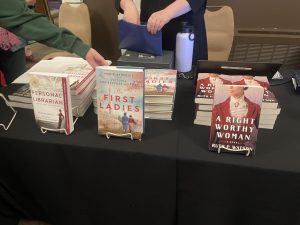The Library of Congress hosted a book talk titled “First Ladies: Historical Fiction About Pioneering Black Women” in celebration of Women’s History Month, at their weekly “Live! at the Library” event March 14.
The featured panelists at the talk included authors Victoria Christopher Murray, Joshunda Sanders and Ruth P. Watson. The women read aloud sections of their books and discussed the ways each features the experience of Black women in the United States historically and in the present.
Author Joshunda Sanders said that historical fiction plays an important role in humanizing the stories of Black women in history by centering Black joy and emotion.
“How did they kiki and kick it when they were not working?” Sanders said at the event. “I think the archive needs to humanize us, to reintroduce us to American history and to say that ‘This is also what a patriot looks like,’ is that we could pass around mason jars of moonshine after hours. We can also go to the officer’s balls and then all the things, and I think it rounds out and completes the story of who we are in America.”
Murray’s novel “The First Ladies,” written alongside Marie Benedict, tells the story of the friendship and working relationship between former first lady Eleanor Roosevelt and civil rights activist Mary McLeod Bethune. The book focuses on their advocacy to get Black representation in the government and to pass anti-lynching legislation.
Murray said the interracial friendship between Roosevelt and Bethune reflects the authentic connections fostered between women with different lived experiences.
“These were two women, one Black and one white, wanting to be friends, coming from different worlds, seeing the same situation very differently and trying to work it out. And that’s all they had. They made a lot of mistakes with each other. But we make mistakes with our friends all the time. The stakes are just higher if it’s racially based,” Murray said at the event.
Joshunda Sanders, author of “Women of the Post,” a novel about the all-Black battalion of the Women’s Army Corps during World War II in Birmingham, England, described the bravery of pioneers like Commanding Officer Charity Adams Earley, who stood up to her white male general.
“I think there’s an expectation for there to be this sort of dignity and poise in the face of continued disrespect and dehumanization and demeaning conduct, specifically by white people and specifically white men in the military,” Sanders said at the event. “And what I appreciated about her was that she could be respectful and composed, but she also drew a line in the sand.”
Famously, Adams Earley responded to a general threatening to replace her with “over my dead body, sir.”
Watson’s novel, “A Right Worthy Woman,” profiles Maggie Lena Walker, the first Black woman to establish and preside over a bank. Watson said Walker’s resilience and bravery helped her as she fought to ensure Black-owned businesses received loans and were given fair treatment in banks.

“She was a woman who had a vision, but she also was not afraid. And I think fear is the one thing that keeps most of us from being successful,” Watson said at the event.
Murray discussed Eleanor Roosevelt and Mary McLeod Bethune’s advocacy around anti-lynching legislation. Although there was an effort by the Senate to pass anti-lynching legislation in 1934, President Franklin D. Roosevelt ultimately refused to support it, and the bill died before being voted on.
“They cried together over the lynching bill not being passed, and I often wonder what they would have thought when this happened in 1935, what they would have thought that the lynching bill did not pass until 2022,” Murray said.
The Emmett Till Anti-Lynching Act passed in 2022, declaring lynching a federal hate crime offense.
Sanders said that Black women in America are often not given the credit they deserve, similar to the women in the novelists’ books.
“You have to thrive knowing that you are not meant to survive. We operate in places that are not built for us and we thrive in them. And that continues to be the case whether or not people give us credit or not,” Sanders said.
Watson quoted James Brown’s hit song “It’s a Man’s Man’s Man’s World,” saying that the women represented in their books were essential to the America of today.
“This is a man’s world — James Brown said it best — but it wouldn’t be nothing without a woman or a girl,” Watson said.








